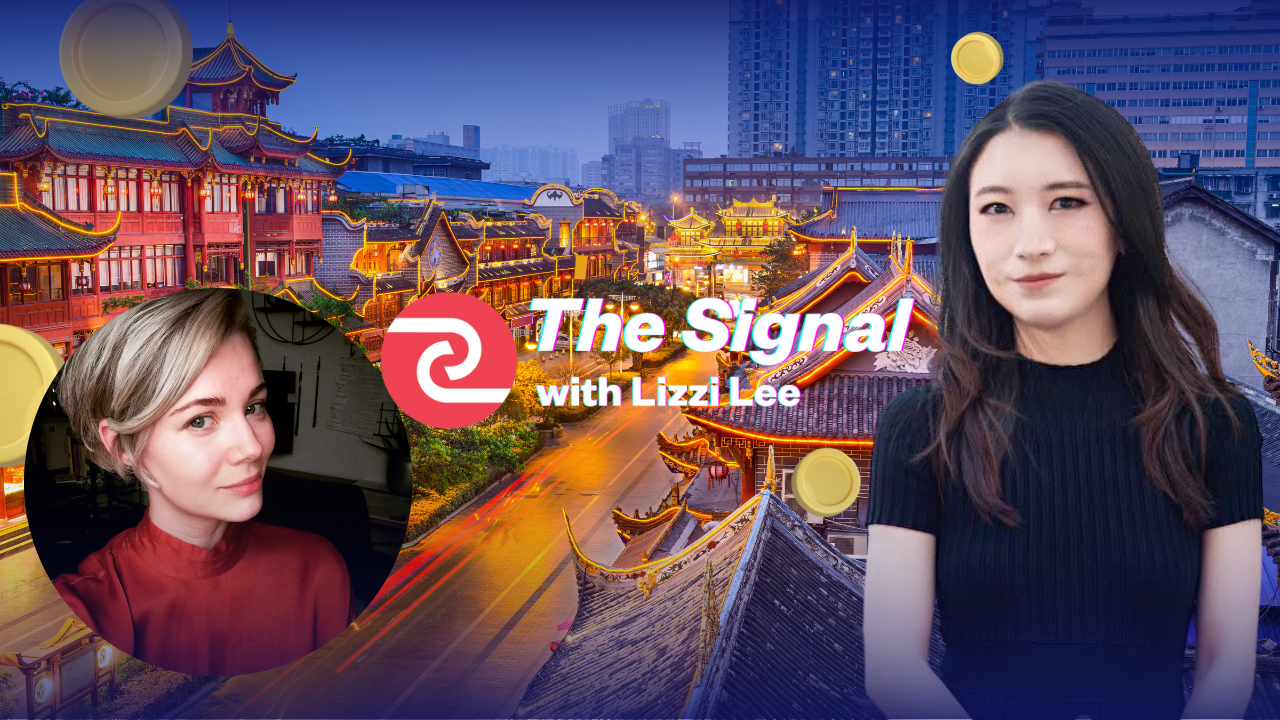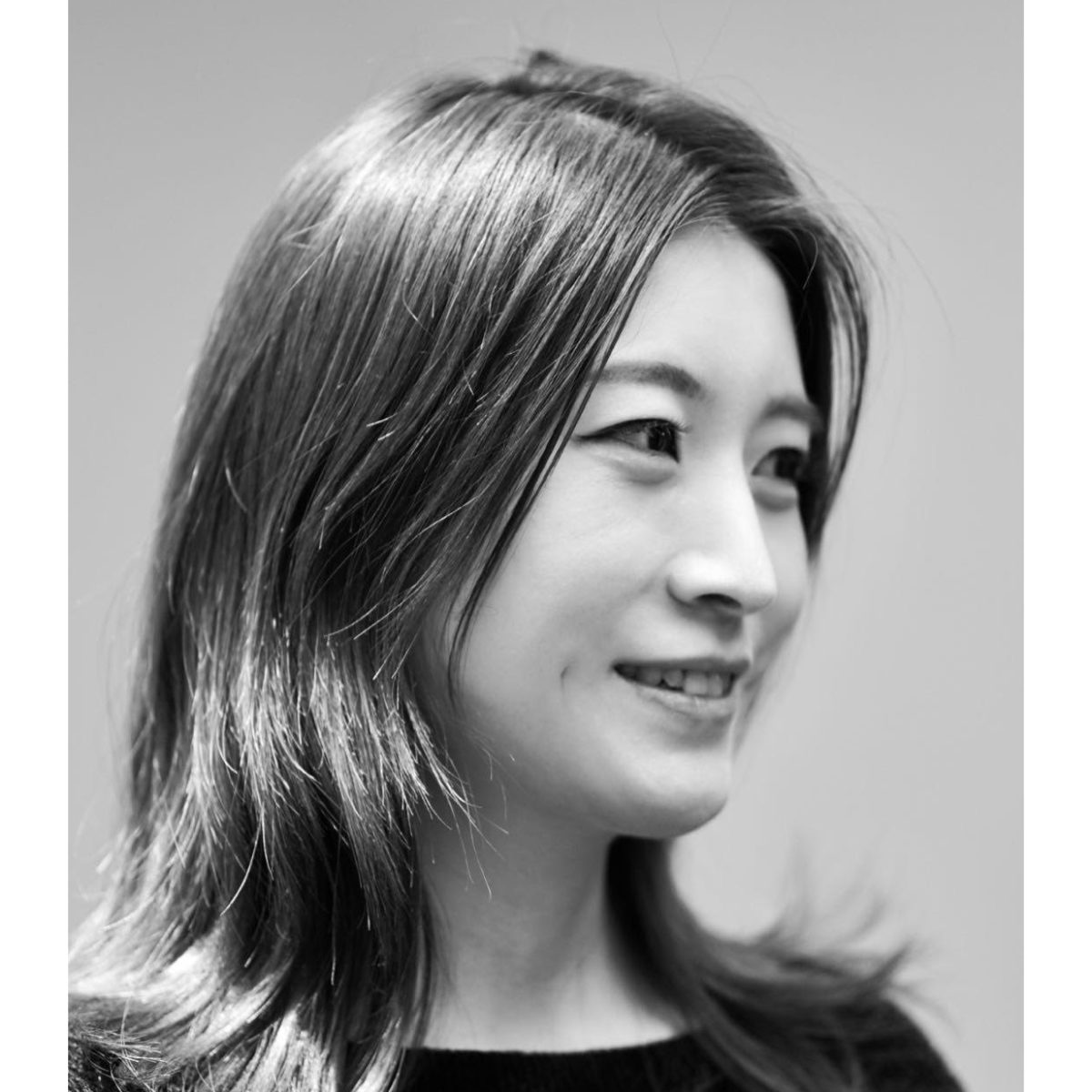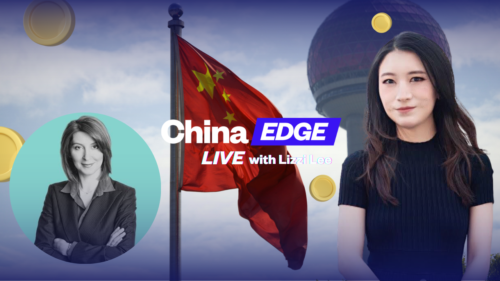Talking about Chinese authoritarianism on TikTok | Live with Lizzi Lee
China scholar Abbey Heffer spends her time breaking down Chinese authoritarianism on social media. This is what she had to say about her projects, and about China’s local experimentation under Xi.

Below is a transcript of the video:
Lizzi Lee: Hello and welcome to this episode of Live with Lizzi Lee powered by the China Project. I’m your host, Lizzi. Joining me today is Abbey Heffer. Abbey, you’re a China scholar. You study authoritarianism, the relationship between the central regime in Beijing and diverse local governments across China. Your Ph.D. project focuses on how local policy experimentation has changed during Xí Jìnpíng 习近平. But before we talk about all that, you have another project called the Open Bookshelf. Can you tell us a little more about that project?
Abbey Heffer: Yeah. So the Open Bookshelf is across platforms, it’s on TikTok, it’s on Instagram, and on Twitter as well. And the aim is to contextualize a few buzzwords, the kind of political buzzwords that come with baggage, and explain them in a more normal way. So a lot of these buzzwords are thrown around without those who use them really knowing what they mean. And I don’t just mean that they used it inaccurately. It’s that these words that then become shorthand for everything that we as a kind of in-group, really want to be affiliated with. Like authoritarianism, for example.
And in the context of authoritarianism, I think that does a huge disservice to those who live the reality of authoritarian governance, whether that’s at home or abroad. One of the areas that I focus on is protests in China and for protests in China, we really love to portray them as these receivers of state repression rather than as political agents aware of both the risks but also the opportunity involved in the act of protest. And we know that some protesters could exploit the local governments’ tendency to repress fast and give concessions later. It gives them leverage in negotiation processes. But that’s not something that’s really talked about because our mainstream understanding of authoritarianism erases this innovation and this ingenuity on the part of ordinary Chinese citizens in favor of a story that centers on the authoritarian state and not a lot else. And I personally worry that when we send to authoritarian regimes as a sort of the focal point of, “well, at least we’re not like them” in politics, we blind ourselves to a lot of the authoritarian practices that our regimes perpetuate.
And to come back again to the issue of protest, I’m not sure if you’re aware of the current “clampdown,” as our government calls it, on protests in the U.K., and some public figures like union leaders have compared our clampdown to how protest is handled in countries like Russia and China, so authoritarian regimes. And in the public discourse, when this comparison kind of sits at the regime level, I’m not really convinced it’s a very valid comparison. First off, I mean, the U.K. government’s repression of protest is significantly lower than China’s.
But if we break it down and we look at individual authoritarian practices, like I talk about a lot on the Open Bookshelf, so in this case, it would be the U.K. government’s legislation that allows the sitting government, rather than the independent judiciary, to decide which acts of protests are illegal or not and in each case.
Suddenly the comparison becomes very, maybe too real. So my approach with the Open Bookshelf is to try and encourage people to take authoritarianism at face value but also to see it as a facet of their everyday lives experience rather than just an abstract, far-distant issue on the other side of the world that usually involves China or Russia.
Lizzi: I see. So, I actually came across your work on TikTok. I find your way of connecting academic research with a nonspecialized audience really refreshing. You have many episodes on TikTok. Which episode is your favorite, or which episode has the highest engagement from the audience?
Abbey: Um, I think the one which is my favorite and the one which has the highest engagement are probably the same, but one of the videos that got a lot of engagement was where I quoted and then problematize one of Eric Li’s infamous quotes. So you’ve probably seen it, almost definitely saying it where he says, In America, you can change the political party, but you can’t change policy. And in China, you can’t change the party, but you can change policy. And this got a lot of attention. I even did a little remake of it this week in light of the China Quarterly article coming out. And I think it kind of taps into this urge to constantly compare the U.S. and China to see which one is more bad and which one is more good.
And it’s a very easy argument to give extreme answers to. And my approach was basically, “Ummm, yes, but also no.” So sure, ordinary people can get involved in local policy experimentation, for example. But generally, this only proves effective in certain circumstances, like if they live under a responsive, entrepreneurial local government or have really good “guanxi” or potentially if they’re willing to protest. But that’s a slightly newer research project on my part. I probably shouldn’t talk about it yet. It was an interesting post, and it inspired a lot of discussions, I have to say.
Lizzi: So that’s terrific. And we will also put a link to your TikTok account so our audience can check out the other videos you have out there. So speaking of this knowledge gap between, you know, we academics and the general public, what aspect of China or Chinese governance do you think the public needs to understand much better?
Abbey: Yeah, these questions are always a bit of a double-edged sword because some of the most important areas are my research area per se. So I think one area that the public really needs a better, more nuanced understanding of is what Chinese influence actually is. So right now, we’ve got this in the U.K. at least, I’m not sure how it is in the U.S., but there’s this really convenient focus on Confucius Institutes. And the U.K. has said they want to get tough on China, which, okay, right. It’s an important, realistic policy goal. But their version of getting tough on China is closing all Confucius Institutes. And I’ve done videos on this before. But closing Confucius Institutes, it all looks very nice politically, and it causes a lot of conversation online, for example. And it also serves the nice purpose of making sure that only a specific social class of wealthy, probably business-minded citizens are able to learn Chinese and get involved in China policy. But it doesn’t really solve any problems in terms of the Chinese state extending its control across borders. And it’s not my research area, but I also worked with local governments in China, and I’m not sure if I mentioned that to you, between 2014 and 2016. And these are the local government officials who are responsible for this, this soft power, influence work, and everything else.
So policy, experimentation, policy implementation, they’re responsible for a lot. And I saw firsthand how much leverage even just a local government was able to extend via the British companies investing in their jurisdiction. And I think Unilever probably has a bit more sway over government decisions than maybe me and my mates learning Chinese at Confucius Institute. But we don’t seem to talk about much in the public discourse. It’s all closing Confucius Institutes Cultural Influence over the British public. When actually there’s a lot more going on here and something that you probably understand a lot better than me, the influence of the Chinese state extends to harass overseas Chinese individuals and communities as well. Where’s the policy to get tough on this kind of harassment to protect, for example, the British overseas Chinese community? But instead, they do the whole xenophobic thing and do anti-China Yellow Peril. As part of that tough policy. Yes, it’s interesting. I’d love to time my research to it, but I’m focusing on policy experimentation because that’s a lot more.
Lizzi: Fascinating, fascinating stuff. But I also wanted to talk a little bit more about your full-time job as a Ph.D. candidate doing research on local policy experimentation. So, when we speak of local policy, we usually have this belief that, oh, during Xi Jinping’s decade of leadership, there is a lot more power concentrated to the top. Therefore, there must be less incentive to experiment at the local or municipal level. But that’s not the case from your research. Right? And in fact, a very interesting finding of your paper is that local officials during Xi Jinping’s era are actually, you know, even under much more pressure to visibly experiment. I wonder if you can elaborate on that point a little more.
Abbey: Yeah. So, we agree essentially with the major finding that much more power is concentrated at the top under Xi. But that didn’t necessarily begin with Xi’s tenure, for a start. So, we can observe this increasing trend of re-concentration or re-centralization of power since about the early nineties, where local government budgets were reined in somewhat. And then this has intensified on the shape of the various steering instruments, as we call them, the re-centralizing of that power. But this isn’t something new. This is something that many scholars are saying that the centralization and she didn’t necessarily start with him.
What we struggled with then was this idea that the central government would intentionally try to disincentivize local policy experimentation, which as we all know, has been a major factor in China’s ability generally to adapt and to excel economically, but also for local governments in terms of local development, quality of life. Local experimentation contributes to what scholars call authoritarian resilience. So, the strength and longevity of the Chinese regime. And it seems like a net good even when you have issues of entrenched interests and corruption, which challenge the logic of giving local governments such extensive freedoms.
So what we needed to ask then was, if experimentation itself is useful, why would the center try to prevent it wholesale? But even if the center isn’t trying to prevent experimentation, it may still be looking to control it in some way. And this is where this re-concentration of power comes in really handy, because what many of us have observed is that this increased power to steer local government decision-making through, for example, those hot budgets that I mentioned and the anti-corruption campaign, but also direct intervention.
This hasn’t gone away. And one of my favorite China scholars, Jessica Teets, I think she’s American and she and her colleagues found that local officials are then very unwilling to experiment under Xi. But because of this recentralization of power that we’re observing, they can’t really say no to any demands or commands from the central government.
So if these local officials are still visibly initiating experimental policies, as we found when analyzing these thousands of regulatory documents, and if they’re still visibly and publicly experimenting, as our studies showed, there must be a command from the center to experiment rather than not to experiment. And disobeying that command must be riskier than the risks already associated with experimentation itself.
So what we are arguing is that actually, it’s because of this increased steering capacity, this concentration of power at the top, that we’re seeing more experimentation rather than less. And as for the visibility aspect of that question. One thing that we did not set out to cover, but something that we have assumptions about, is whether or not this mandated experimentation actually leads to quality innovation or quality policy solutions. So one aspect of the experimental policy process-I’m sure you’re familiar with this- that has been studied is how local policy experiments diffuse to the higher level. So there’s a great study by another one of my favorite China scholars, Min Ye, where she details how successful local experiments are later integrated into national policymaking. And one of the biggest examples is, of course, reform and opening up, which started in Guangdong, in Fujian, in the immediate aftermath of Mao’s death. So a very interesting time to be studying political experimentation. But this has been a marker of successful experiments, and it leads to a diversity of central quality. But it can take decades to analyze that.
Another example is a study by Jane Duckett on rural health care reform, which went through lots of phases in the experimental process, through experimentation itself, evaluation, and reevaluation. And it can take a while before we really see what these experiments that have been started under Xi… Where they go, do they make it to the provincial or the central level? So, when I say visible experimentation, I’m not speaking to how genuinely innovative that experiment might be because genuine innovation is really risky. And one of the big things we looked at was how risk-averse officials also experiment, not because they necessarily are willing to or because they have a great idea, but in compliance with the central command, they might then turn to more, as Iza Ding calls it, performative governance or more performative experimentation to reduce their exposure to this personal risk while still visibly experimenting, which would then have this knock-on effect that less local experiments make their way up the provincial or even to the national level. So less successful experimentation is going on but would genuinely contribute to central policy innovation that has made this fascinating.
Lizzi: Fascinating. So, we will also put a link to your research article. Our interested audience can also take a look. I think it’s super interesting that you are studying Chinese politics, not at the top level, not just at the top level but also at the subnational level. Why do you think that approach is important, and what are some of the surprising findings you’ve discovered in your research when you zoom into the local and municipal level of policymaking?
Abbey: Yeah. As soon as I saw this question, I thought, oh, this will be a big… This is the meaning of my life, basically. So, I think you miss out on a lot if you’ve got only your eyes on the central government or what Xi Jinping is up to. We all know China is a huge country with huge variations in local administrative and power structures. The way that the local government system works in Xinjiang is an entire world away from how local governance works in Jiangsu or Fujian.
And I think this kind of ties in with what I was saying about researching authoritarian practices rather than just authoritarian regimes. But I think there’s a lot that goes on at the subnational level, particularly in China, which especially in terms of responsive or even normally democratic processes or practices. It could be praised. This could be something where we could do some really fruitful signaling work as an international community to highlight these positive cases of responsive or progressive subnational governments and indicate to other governments what practices and policies could earn them international praise, perhaps high levels of international cooperation. But and this is important, even when we’re studying Chinese politics at the subnational level, you cannot be aware of what’s going on at the top.
So no matter what aspect of subnational politics you’re looking at, it’s always subject to the shadow of hierarchy, which is why we decided actually to repurpose quite an old German political theory of political steering theory that we mentioned in the article, which looks at subnational politics without losing sight of the national. So simultaneous perspective. Maybe an easier way to explain what I’m trying to say is maybe an example. We all know about the local experiments with direct elections, and direct democracy. You’ve probably heard of these local township elections that just spread all across the country, the Hú Jǐntāo 胡锦涛 era. There were thousands, just thousands of cases. And it really looked like it was going to spread upwards and become national policy. And scholars of the experimental policy process were so excited about all of this.
And then there’s a great study by Pang — I’ll have to look at the reference to give it to you. But it’s I think it’s Rosemary Pang, which looks at how central intervention under Xi put a stop to these experiments and imposed a centrally approved version of elections rather than those which developed locally. So local experimentation and subnational Chinese politics, exist under this constant threat, for better or for worse of central intervention. And sometimes, it stops these seemingly democratic developments at the local level. But sometimes, that intervention also punishes local officials for repressing protests too harshly. But either way, there’s always this risk of central interface intervention that. Conditions and influences all these local policy behaviors. And this relationship just… It gives me life. That’s all I want to do with my life.



